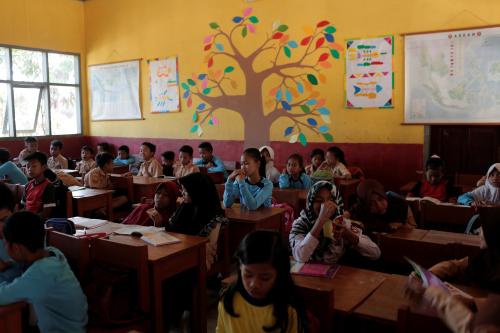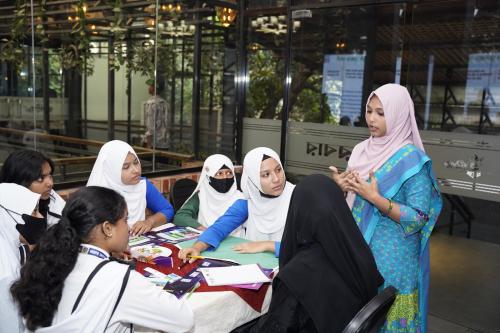This piece is a summary of the new report, Millions Learning Real-time Scaling Labs: Designing an adaptive learning process to support large-scale change in education, which can be downloaded here.
We can all point to innovations around the world that are making an enormous difference in children’s learning. These, however, do not translate to the systemic change needed to solve the global learning crisis. While there is growing evidence around which educational strategies improve children’s learning, we know much less about how to translate this into improved policies and practices at scale.
We believe scaling evidence-based education interventions requires a combination of technical and political strategies, mechanisms to accelerate the adoption of new practices, and strengthening local capacity for successful adaption and scale. Building off the report Millions Learning: Scaling up quality education in developing countries, the Center for Universal Education (CUE) is launching Real-time Scaling Labs in partnership with local institutions in a number of countries and U.S. cities to generate more evidence and provide practical recommendations around the process of scaling in global education, encouraging a stronger link between research and practice. These labs are not physical spaces, but rather a process established by CUE and partner institutions to learn from, support, and document existing efforts to scale interventions focused on improving children’s learning as they unfold in real-time. The ultimate goal is to support initiatives as they scale while simultaneously gaining deeper insight into how policymakers, civil society, and the private sector can most effectively work together to bring about large-scale transformation in the quality of children’s learning and their development.
In our latest report, Millions Learning Real-time Scaling Labs: Designing an adaptive learning process to support large-scale change in education, we detail the design, approach, and methodology for these scaling labs. Drawing from a scan of existing collective impact mechanisms, relevant literature, and informed by input from policymakers, practitioners, funders, and researchers from around the world, CUE has developed an overarching, flexible methodology for the Real-time Scaling Labs. This common framework and approach for all of the Real-time Scaling Labs is detailed in the report, which intentionally is flexible enough to be adapted with local partners to suit the context of each lab.
As discussed in previous blogs, the core principles of the scaling labs include taking a systems approach, being problem-driven and user-centered, engaging diverse stakeholders, focusing on both technical and political considerations, and employing quick feedback loops all with the intention to support lab participants to use real-time learning to accelerate progress towards their scaling goals.
The lab process (typically three to four years) will involve a series of in-person and virtual convenings and workshops that bring together policymakers, practitioners, and a diversity of other stakeholders around a particular education initiative or set of initiatives in the process of scaling.
- Initial convenings will focus on articulating a shared scaling goal for the intervention and determining the potential scaling pathways, along with identifying opportunities and obstacles currently confronted in achieving those scaling goals and progress towards scale.
- The lab will then support a process for developing and/or refining a scaling action plan that addresses root causes of the scaling challenges identified and leverages opportunities to accelerate scaling, drawing from the Millions Learning framework and the broader scaling literature.
- Participants will put scaling plans into practice and reconvene periodically for reflection periods, to assess the process, determine what elements should be adjusted, analyze what lessons have been learned thus far, and evaluate their progress along the scaling pathway towards the end goal.
- The lab will employ an iterative process of testing and refining change ideas to strengthen scaling efforts, which will allow participants to review data collected and learn from what works and what does not work, adjust scaling plans, and ultimately progress along the scaling pathways identified while also improving capacity to scale.
Figure 1: Real-time Scaling Lab Iterative Learning Cycle

In summary, the lab will provide a reflective, neutral space for stakeholders to discuss shared challenges and opportunities faced in scaling a particular education intervention, discover the underlying causes of those challenges, and identify and adapt approaches to address these issues, ultimately contributing to improved learning outcomes for children and youth.
In this report, CUE provides a high-level plan for designing and implementing the scaling labs, building on existing approaches and drawing from relevant theory and practical experience. This includes a step-by-step guide to the lab approach (to be tailored with partners in each location), potential tools to support the process, an approximate timeline for the lab process, criteria for lab selection, greater detail on lab participants, key research questions, communications and data sharing mechanisms, and metrics of success. Of course, in the iterative and adaptive spirit of the entire Millions Learning project, we anticipate this lab approach will continue to evolve and be refined throughout the life of the project, based on input from participants and key stakeholders in-country and real-time learning from implementing the labs.
To learn more about the Millions Learning Real-time Scaling Labs or provide input on the lab process, please contact Molly Curtiss at [email protected].
The Brookings Institution is committed to quality, independence, and impact.
We are supported by a diverse array of funders. In line with our values and policies, each Brookings publication represents the sole views of its author(s).







Commentary
A proposed blueprint for supporting large-scale change in education
July 3, 2018